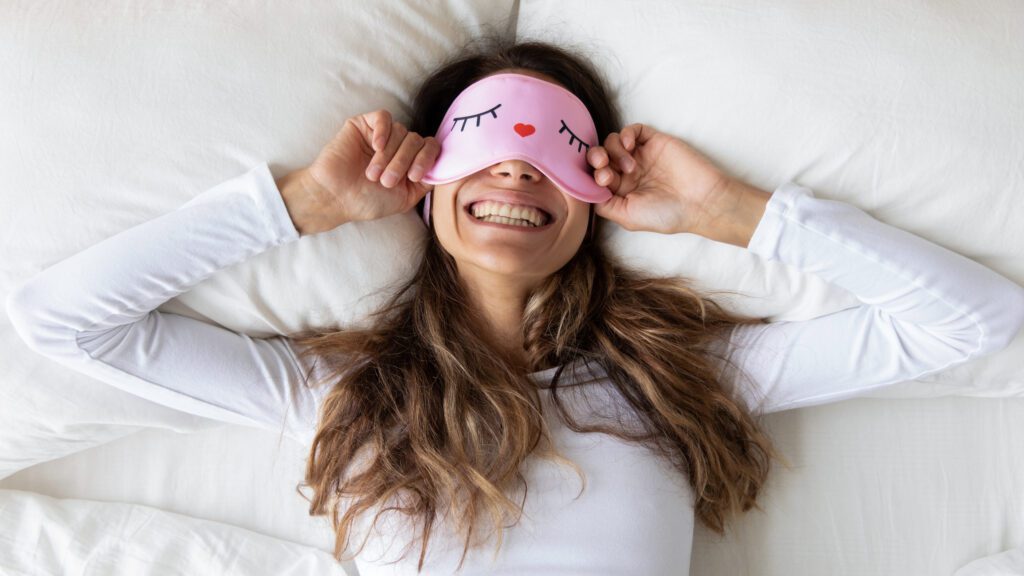Sleep Tips for Menopause: How to Finally Sleep Better
If you’re staring at the clock at 3am, waking up drenched in sweat or lying there with your mind racing – you might be in perimenopause and looking for sleep tips. No matter how tired you are, you just can’t seem to get a good night’s rest. You’re exhausted, emotional, and running on empty, yet sleep still feels impossible.
If this is your reality right now, you’re not alone. So many women going through menopause struggle with their sleep—it’s one of the first symptoms of perimenopause and a common issue. Sadly, problems don’t disappear post menopause either.

The good news? There are practical, proven sleep tips for menopause that can help you sleep better. Let’s explore why menopause affects your sleep, why rest is so important, and what you can do to reclaim your nights.
How Menopause Affects Your Sleep
Hormonal changes during menopause are often the main culprit behind sleepless nights. As oestrogen/estrogen and progesterone levels drop, they disrupt your body’s ability to regulate temperature, mood and your natural sleep-wake cycle.
Here’s what might be happening:
- Hot flashes and night sweats: You wake up drenched, overheated, and uncomfortable. Cooling down takes time, leaving you wide awake.
- A racing mind: Lower oestrogen can increase anxiety levels and make it harder to relax into sleep. Thoughts can be swirling in the middle of the night and maybe feelings of panic too.
- Frequent wake-ups: Needing to pee, aching joints, or random restlessness can make staying asleep feel impossible.
Every woman’s experience of perimenopause is unique, but these common menopause symptoms can wreak havoc on your rest. Read on to discover practical ways to improve your sleep in menopause.
Why Sleep Matters During Menopause
When sleep becomes a nightly struggle, it doesn’t just leave you feeling tired. Poor sleep during menopause can:
- Worsen menopause symptoms like brain fog, mood swings, irritability, and fatigue.
- Disrupt hormones further, increasing cravings and making it harder to manage your weight.
- Raise the risk of health issues like heart disease, diabetes, and depression.
- Strain relationships with your family.
- Make showing up at work much harder.
Sleep isn’t just about surviving the day—it’s essential for protecting your physical, mental, and emotional health.
6 Sleep Tips for Menopause You Can Use Tonight
If sleepless nights are running your life, here are six actionable tips to help you sleep better during menopause:
1. Wake Up at the Same Time Every Day
Yes, even on weekends! Sticking to a consistent wake-up time helps reset your body’s internal clock, making it easier to fall asleep and wake up refreshed.
2. Keep Your Bedroom Cool
Hot flashes and night sweats can make you feel like your bed is a sauna. Keep your bedroom cool—around 18°C/65°F is ideal. Use breathable bedding, invest in a fan, or try a cooling pad or pillow to help you stay comfortable.
3. Limit Caffeine After Lunch
Caffeine sticks around in your system longer than you think, making it harder to fall asleep. Switch to decaf after midday to avoid sleep disruptions.
4. Get Morning Light
Spend 10–15 minutes outside or by a window within the first hour of waking. Natural light helps reset your circadian rhythm, supporting better sleep at night.
5. Move Your Body Daily
Regular exercise—like walking, yoga, or dancing—can improve your sleep quality and help manage menopause symptoms. Just avoid intense workouts close to bedtime, as they might leave you feeling wired.
6. Stop Clock-Watching
Staring at the clock when you can’t sleep only makes things worse. It raises anxiety and pushes sleep further away. Turn clocks away from your bed and keep your phone out of reach to reduce the temptation.
7. Consider Hormone Replacement Therapy (HRT)
HRT can help your sleep by boosting your falling hormone levels. It can work well but not for all women. And all women can or want to take HRT either. Many of my clients are on HRT but still have sleep problems. If that’s you, there is a proven, natural alternative for that works well to fix insomnia.
When Sleep Tips Aren’t Enough
If you’ve tried these sleep tips for menopause and still find yourself struggling, don’t lose hope. Many women benefit from Cognitive Behavioural Therapy for Insomnia (CBTI), a proven, science-backed approach to treating insomnia.
CBTI works by helping you:
- Identify and change habits that are keeping you awake.
- Reframe unhelpful thoughts like “I’ll never sleep again” into calm, constructive ones.
- Build a personalized sleep routine that works for your life and body.
CBTI is highly effective and shown to work with perimenopausal & post-menopausal insomnia and provides long-term results without medication. It’s the gold-standard approach to insomnia as recommended by the NHS (UK), American College of Physicians (USA) and Australian Menopause Society and many more authorities worldwide.
Take the First Step Toward Better Sleep
You don’t have to live with sleepless nights forever. With the right strategies and support, you can manage menopause sleep struggles and wake up feeling rested, refreshed, and more like yourself again.
Here’s how I can help:
💡 Join my free Mini Sleep Training to learn simple, actionable steps to start sleeping better tonight.
💡 Book a free 15-minute call to discuss your sleep challenges and explore solutions tailored to you.
Conclusion
Menopause doesn’t have to mean endless nights of frustration and exhaustion. By following these sleep tips for menopause, you can take back control of your nights and protect your health.
Your journey to better sleep starts with small, meaningful changes—and I’m here to guide you every step of the way.
Socials